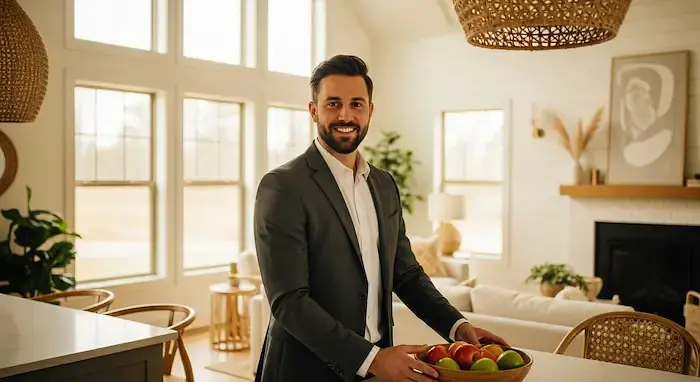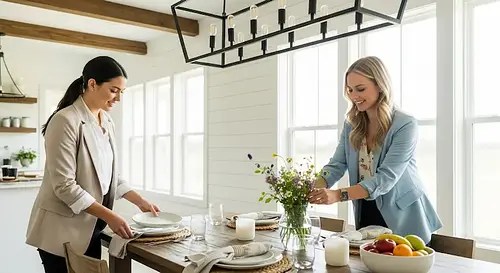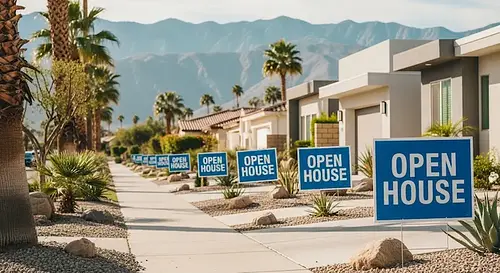Who Pays For An Open House? Fees, Costs And Considerations
Wondering who’s responsible for paying for an open house? In this guide, you'll learn what agents typically spend, what fees to expect, and how to keep your costs low while still making a great impression.

Written by Seth Cox
Jul 21, 2025 / Open house marketing
The truth is, it depends. Your market, your goals, and your approach all play a role. Some agents spend nothing at all, while others invest hundreds of dollars to create a premium experience for buyers. On top of that, there are important legal rules to keep in mind. For example, can a lender help pay for food or marketing materials? In most cases, the answer is no.
In this guide, you'll get a clear breakdown of who pays, what typical open house fees look like, how to budget effectively, and how to stay compliant with real estate laws like RESPA. Whether you're preparing for your first open house or trying to improve your return on investment, this article will help you make smarter, more confident decisions.
Who Typically Pays for an Open House?
That includes the signs, the flyers, the snacks, the candles, the water bottles, and anything else you set out to make the place feel warm and welcoming.
Sellers almost never contribute—unless the property is a million-dollar listing or the seller is especially hands-on. Even then, it’s rare. Agents pick up the tab because open houses aren’t just about selling that home. Also, this is what the commission is for.
Open houses are about meeting new buyers, connecting with neighbors, and planting seeds for future listings. It’s a marketing expense, not just a service.
If you're part of a team or brokerage, there might be a shared marketing budget or some reimbursement for materials. Just don’t count on it covering everything. Most agents still pay out of pocket for the little details that make an open house feel personal.
But, what if you’re hosting for another agent? That’s where showing agent fees come in. Maybe another agent on your team needs coverage, or a top producer tosses you a listing to host in exchange for buyer leads. Sometimes there’s a flat fee, sometimes it’s just a handshake deal. Either way, make sure expectations are clear before you show up with pastries and a Bluetooth speaker.
In a nutshell:
- Most agents pay their own way
- Sellers usually don’t chip in
- Teams and brokerages might help, but not always
- Hosting for another agent? Set terms upfront
.webp)
What Does an Open House Actually Cost? A Realistic Look
The truth is, there’s no “right” number—only what makes sense for the kind of event you’re running. Are you farming a neighborhood? Selling a $1.3M home? Trying to impress the seller? Or just doing your job, quietly and efficiently? Your purpose should shape your spend.
Most open houses fall into one of three categories:
Lean or No-Budget Events
These work well for:
- Entry-level listings
- Repeat events at the same property
- Agents who already have foot traffic from signs or social
Mid-Tier Marketing Efforts ($200 to $500)
These open houses are ideal for:
- Homes in competitive price ranges
- New listings with decent seller expectations
- Events where neighbors or future sellers will likely drop by
Showcase-Worthy Experiences ($500 or more)
These are best used for:
- Luxury listings or builder model homes
- Events designed to generate social content or video walkthroughs
- Sellers who expect a premium experience and will judge your marketing
No matter which tier you choose, the key is intention. Some of the most effective open houses are low-budget but high-effort. Others spend more but fail to follow up. It’s not about what you spend—it’s about what you do with it.
Now that you’ve seen the high-level strategy, let’s look at where the money usually goes and what those costs look like in the real world.

The Most Common Open House Fees, Line by Line
Here’s a complete breakdown of the most common categories where agents spend money, what those costs look like, and what’s usually worth it.
Marketing and Promotion
- Directional signs and yard signage: $15–$50 each. A one-time investment if you reuse them across listings. Branded signs look sharp, but generic “Open House” signs work just fine in a pinch.
- Printed flyers and handouts: $25–$100. These usually include home features, your contact info, and maybe financing details from a preferred lender. Agents often overprint—stick to 15–20 copies unless you’re expecting a crowd.
- Postcards to the neighborhood: $100–$250. Useful if you’re farming the area and want to double your event as a listing magnet. Otherwise, skip them.
- Social media ads: $25–$100 per boosted post. Target local audiences a few days before the event. For most price points, $40–$60 gets solid reach.
- Digital sign-in: $0-$49/month. Helps capture leads cleanly and feeds them directly into your CRM.
Our take: Yard signs and lead capture software are essentials. Flyers and ads can help, but don’t treat them as a flex.
Food and Hospitality
- Bottled water or soda: $5–$20. Keep it simple and brand-free unless you’re in a luxury market.
- Cookies or pastries: $15–$40. Individually packaged snacks work best for ease and hygiene.
- Charcuterie board or upscale snacks: $50–$100. Great for mid-range or premium listings, especially afternoon events.
- Wine, coffee cart, or catered setup: $150–$300. These belong in the luxury tier or special marketing events.
Worth it? For everyday open houses, a $20 snack station is enough. Save the upscale spread for listings where it truly matches buyer expectations.
Cleaning and Staging
- Basic professional cleaning: $75–$150. A one-time cost that instantly improves buyer impressions.
- Scented candles or neutral air fresheners: $10–$25. Avoid strong scents—aim for fresh, not perfumed.
- Fresh flowers, rugs, throws, or table settings: $25–$75. Targeted props can highlight awkward or underused spaces.
- Professional stager (consultation or partial staging): $300–$1,000+. Often negotiated with the seller or bundled into your listing package.
Rule of thumb: Cleaning is always a yes. Light staging is optional but powerful. Full professional staging should be reserved for high-value listings or vacant homes.
Hidden Costs Agents Often Forget
- Fuel and travel time: If you’re driving back and forth for prep, signage, and cleanup, the hours add up.
- Print test runs or design time: If you’re picky about flyer layout or signage, budget for revisions and reprints.
- Last-minute runs to Target or Costco: These are the real budget killers. Plan ahead to avoid them.
Can a Lender Pay for Your Open House? What RESPA Says
What RESPA Actually Prohibits
That includes:
- Paying for your open house catering
- Covering the cost of your printed materials
- Buying your signs, folders, or promotional ads
- Giving gift cards or “thank you” money for including them in your marketing
What Lenders Can Do (With Limits)
- Co-host the event: Lenders can attend the open house, greet buyers, and answer questions about financing.
- Bring their own materials: They can display their flyers, business cards, or brochures at the event.
- Sponsor something clearly branded: If a lender provides food or drinks, it must be obvious that they paid for it. Think labeled boxes or signage that says “Compliments of XYZ Mortgage.”
- Receive equal marketing value: If you share costs, the lender must get exposure or services that match what they contributed. And that exchange must be documented.
How to Stay Safe and Professional
- Avoid vague offers: If a lender says, “Let me know what you need and I’ll help out,” say no.
- Use formal agreements if sharing marketing: Some brokerages allow co-marketing with disclosure forms or written cost splits. Get it approved first.
- Never tie payment to referrals: That’s the line you can’t cross. Not now, not ever.
- Ask your broker: If you’re unsure, ask. Don’t guess when compliance is involved.
Bottom line... accepting money for your open house might sound helpful in the moment, but it could cost you your reputation (or worse!) if it violates RESPA. The safest path is to treat your open house as your own business expense, and invite lenders to participate only in ways that are compliant and clearly defined.

How to Maximize Value Without Overspending
That’s why experienced agents get intentional. They don’t cut corners—they cut waste. They know what actually makes a difference and what just looks good in photos.
Spend Where It Pays Off
That’s why agents who host a lot of open houses often invest in:
- Lead capture tool so no one leaves without signing in
- Reused signage that’s clean and on-brand
- Simple, consistent presentation that doesn’t rely on fresh flowers every time
- A clean and well-lit space—even more than snacks or candles
Don’t Burn Money on Ego
When in doubt, ask yourself: Would I rather have someone remember the cookies—or remember the conversation we had?
High-ticket events aren’t wrong. They just need a reason. If you’re doing it for a luxury listing, a seller you’re trying to win over, or a piece of content you’re going to use in future marketing—go for it. But don’t treat cost as a metric for success.
Track What Works, and Let the Rest Go
- Which neighborhoods pull more walk-ins
- Which platforms drive the best turnout
- What details buyers notice—and what they ignore
- How long people stay based on how you set the home up
Are Open Houses Worth the Investment?
But when you look a little closer, most seasoned agents would tell you the same thing: yes, they’re worth it—if you treat them like a business tool, not a favor.
You’re Not Just Marketing the Listing
Many top producers credit open houses as the thing that helped them build their pipeline early on. Not because every open house generated an offer, but because they got face time with real people at exactly the right moment. For example, Payson Robertson generated 10 listings in just 30 days with open houses alone.
The Real ROI Comes After the Event
The Cost Isn’t the Problem—The Strategy Is
If you're showing up prepared, asking good questions, and following up with intention, then yes, open houses are worth every dollar. If you're doing them to check a box or keep a seller happy, the returns are going to reflect that.
Final takeaway: treat your open house like the listing appointment before the listing appointment. Every guest is a potential client. Every neighbor is a potential lead. And every dollar you spend is an investment—if you have a system in place to make it count.
Conclusion: Spend Smarter, Not Bigger
Most agents will pay for their own open houses, especially early in their careers. That’s normal. What separates the pros from the rest isn’t how much they spend—it’s how they spend it. A clean space, thoughtful setup, and solid follow-up will outperform catered food and candles every time.
Know the rules, especially when it comes to lenders. Choose your budget based on strategy, not pressure. And remember: an open house isn’t just about selling a home—it’s about building your business.






